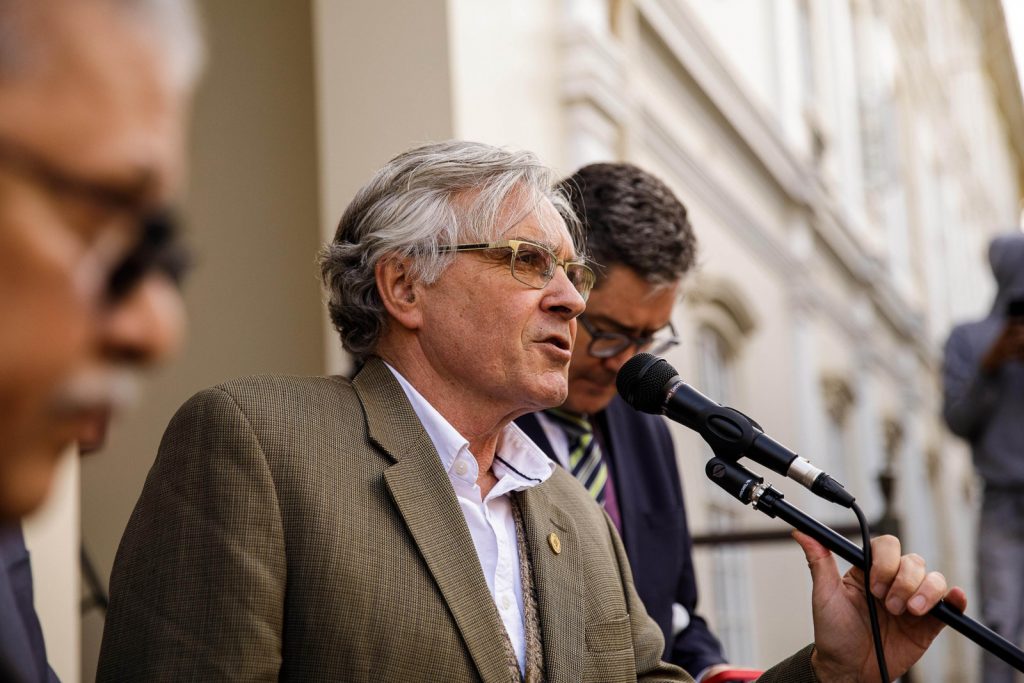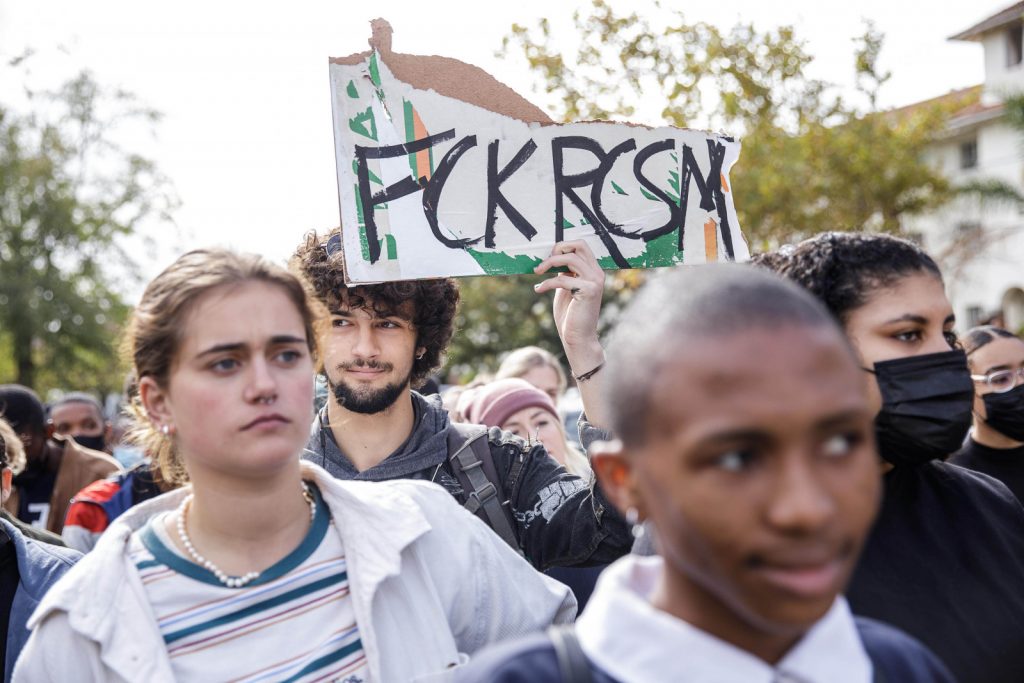Zero tolerance: Students march against racism at Stellenbosch University. Photos: Brenton Geach/Gallo Images & ER Lombard/Gallo Images
The apparent racist incident at Stellenbosch University two weeks ago, when a white student urinated on the belongings of a black student, is not the first. Over the years, there have been several cases of inhumane treatment of black students by white students and various forms of discrimination, especially at campus residences. Many of those cases happened at Huis Marais.
A third-year white student, who did not want to be named, says in his time at the university, racism and racial discrimination often occurs. But very few incidents are thrust into the spotlight or reported.
“I’m not entirely surprised by this incident. I think there are more incidents similar to this than we realise. I think it happens on a daily basis.”
He says there’s a need for the students to stand together and put pressure on the university’s management to eradicate racist practices.
André-Pierre du Plessis, a former Maties student and Huis Marais resident, says that in his experience, initiation and orientation were used as an excuse to humiliate black students. He says the white house committee members were especially harsh on the students of colour.
 Vice-chancellor Wim de Villiers during the South African Students Congress (SASCO) march against racism at Stellenbosch University on May 19, 2022 in Stellenbosch, South Africa. The march follows an alleged racist incident that saw a white student urinating on the personal property of a black student. (Photo by Gallo Images/ER Lombard)
Vice-chancellor Wim de Villiers during the South African Students Congress (SASCO) march against racism at Stellenbosch University on May 19, 2022 in Stellenbosch, South Africa. The march follows an alleged racist incident that saw a white student urinating on the personal property of a black student. (Photo by Gallo Images/ER Lombard)
“A big part of initiation was to make people feel uncomfortable. I remember one black student leaving House Marais during initiation.”
But discrimination based on race and sexuality is not confined to the campus, according to students. A former student who did not want to be named spoke of a homophobic incident last year at one of the bars in the town. A non-binary person was removed from the establishment after trying to use the women’s bathroom. The bouncer allegedly pulled them out of the bathroom.
“Once again, this shows you can’t separate the town’s culture and the university. It’s the relationship that perpetuates this culture of discrimination and microaggressions from race to gender discrimination,” said the former student.
The urine scandal sparked outrage last Monday morning when a 24-second video surfaced of Theuns du Toit urinating on Babalo Ndwayana’s books, laptop and study material. Ndwayana recorded the incident on his cellphone.
The incident has prompted campus-wide protests and a memorandum of grievances under the banner #RacismMustFall was handed over to university vice-chancellor and rector Wim de Villiers.
The vice-chancellor said a zero-tolerance approach to racism and intolerance on campus should be adopted. He fired a warning shot at students who are guilty of questionable practices on campus. “Human dignity is non-negotiable and must be respected, upheld and restored when affected.”
Du Toit faces prosecution after Ndwayana laid charges of housebreaking and malicious damage to property against him.
Du Toit’s father Rudi, a wine farmer in Worcester, has been striking a conciliatory tone, reportedly asking Ndwayana’s father, Mkuseli Kaduka, to have a clear-the-air meeting.
“Yes, he phoned me asking to talk. But I have nothing to say to them,” said Kaduka.
Days before this incident, a female Indian student at the law faculty dance requested a song representative of her culture from the DJ. The response from some of the students was allegedly racist and insulting slurs.
A media release after the incident stated: “Authorities have also met with the affected student. She has been assisted in reporting the matter to the university’s Equality Unit. The law faculty will also ensure that she has access to the necessary counselling services.”
Stellenbosch University doesn’t have specific policies and protocols in place when it comes to serious incidents on campus, according to a university representative.
This, according to students, is of great concern.
“It definitely perpetuates the racist culture. Just think about it: if
someone does something [racist] towards someone else, they do it knowing they’ll get away with it,” said Queen Majikijela, campus chairperson of South African Students Congress.
“That is why we’re asking for some sort of commission to be established, made up of external people, to handle incidents like these on campus.”
A coloured female second-year journalism student, who didn’t want to be named, described the environment at Stellenbosch University as “toxic” and “backwards”.
Leslie van Rooi, the senior director: Social Impact and Transformation at Stellenbosch University, has studied the town’s societal change. He says it has a dark, deep-rooted past that it needs to overcome.
“Historically, the town has a very specific depiction of being the bedrock of Afrikaner nationalism, of which the university of course played a very central role. And linked with that the understanding that it’s a very exclusive town, a town limited to an understanding of nationalist Afrikaner ideals.”
Van Rooi believes much of what is holding the town back from genuinely transforming are “dinner table conversations”, coupled with disillusionment with the government and an overriding sense of fear that the new South Africa won’t allow white people space to play a role in the future of the country.
“These conversations with family and friends and in schools often feed the insecurities. These conversations are based on fear, pain, uncertainty and perhaps also an over-emotive understanding of place and identity in South Africa,” he says.
According to a Cape Times report, an investigation is underway after a manager at a Stellenbosch wine estate and hotel had allegedly racially profiled patrons and guests last month.

An employee at the estate blew the whistle on the racist practices and made recordings of two-way radio conversations where code names were used to distinguish between black and white guests.
The Economic Freedom Fighters in the Western Cape has been focusing on land and race issues in the winelands. Its provincial spokesperson, Melikhaya Xego, has said, “Racism has gained confidence and arrogance and we appeal to those who have been negatively affected to come forward so we may zoom into those spaces where racism has reared its ugly head.”
Complaints about racial prejudice were even placed on the online travel information and booking website, TripAdvisor. After visiting a market at another Stellenbosch wine farm, the guest known as “Lindsay M” posted this on the website: “I recently attended [the] event with my family and the experience was sour. While the natural setting was pretty, there were barely any people of colour besides us, which made for a lot of uncomfortable stares. We were followed by a security guard, and to top it off, we got a condescending attitude from what I suspect was one of the event organisers.”
But, according to Van Rooi, the wind of change is starting to blow through Stellenbosch. He says the town is attempting to rid itself of the “Stellenbosch Mafia” label.
“No town wants to sit with an understanding that you’re an enclave in a Mafia movie-type way that you exclude, determine and rule to a certain degree. So the town is trying its best to be as open as possible, be as allowing as possible, and be as inclusive as possible.”
[/membership]